In this article:
Hypothyroidism refers to the deficiency of thyroid hormones in the body due to the improper functioning of the thyroid gland. (1)
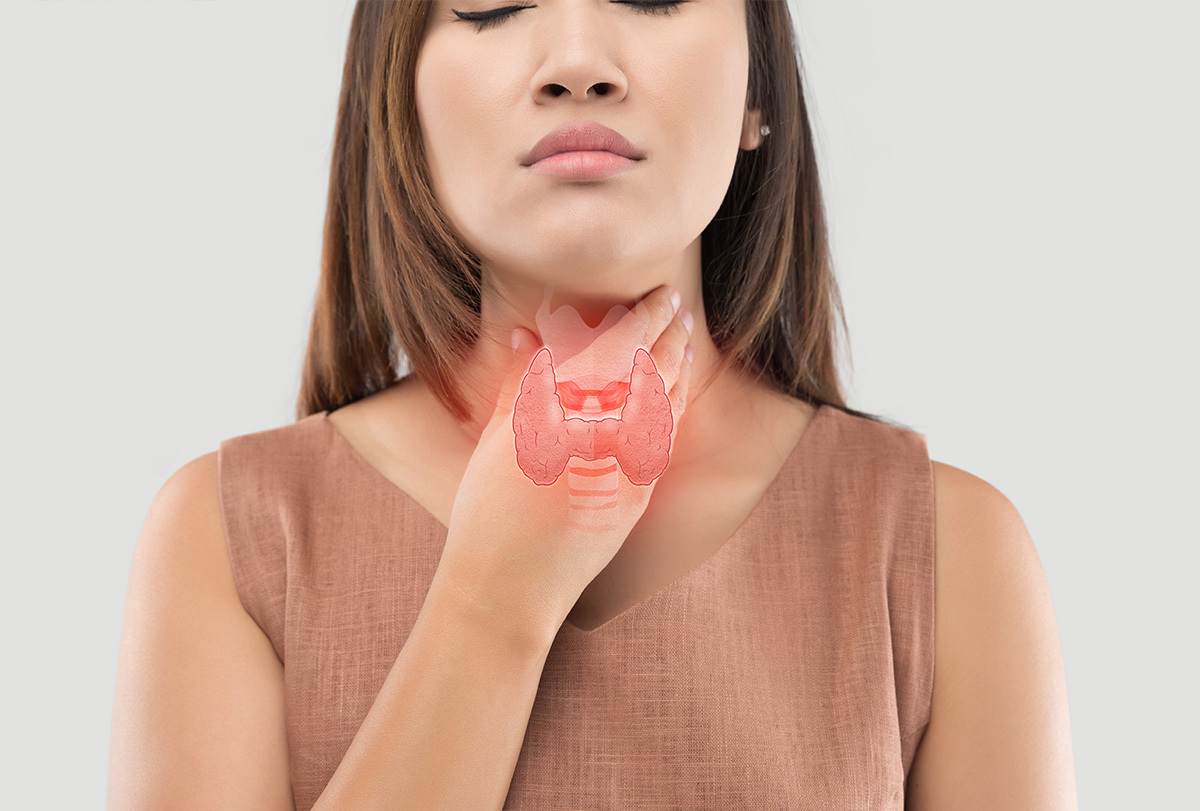
It is a prevalent condition that is easily diagnosable and manageable. However, if left untreated, it can cause numerous and potentially fatal complications. (1)
Since thyroid hormones are involved in energy utilization, a lack of these hormones can slow down your body and manifest various symptoms. However, in some cases, the level of hypothyroidism may be minimal and produce no symptoms, known as subclinical hypothyroidism.
How Common Is Hypothyroidism?
Approximately 5% of women and 3% of men in the United States have subclinical thyroid dysfunction. Additionally, around 0.5% of people are suspected of having undetected overt thyroid disease.
Also, about 4.5% of the total population (12 and above), or 5 out of every 100 people, in the United States are affected by hypothyroidism.
Types of Hypothyroidism
Hypothyroidism can be classified into the following two types:
1. Primary hypothyroidism
A defect in the thyroid gland, resulting in a lack of production of hormones, which is the leading form of hypothyroidism
2. Secondary hypothyroidism
A problem in the pituitary gland, the gland located at the base of the brain that orchestrates the functions of several glands throughout the body, including the thyroid gland, which can result in a deficiency of thyroid hormones.
Causes of Hypothyroidism
The following conditions can result in the development of hypothyroidism:
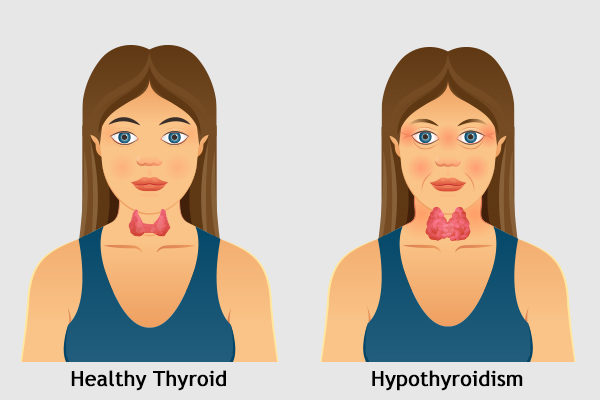
1. Hashimoto’s thyroiditis
It is an autoimmune disorder in which the immune system produces antibodies that target the thyroid gland, causing inflammation, damage, and, ultimately, various degrees of loss of function.
Hashimoto’s is one of the common causes of hypothyroidism in the United States. However, in some cases, it may not result in hypothyroidism, thus not producing any symptoms.
2. Surgery
Conditions such as thyroid cancer, nodules, or Grave’s disease may require partial or complete surgical removal of the thyroid gland. You may still be able to produce the necessary hormones with a partially removed thyroid gland.
3. Iodine deficiency disorder
A diet lacking in iodine can impede the production of thyroid hormones, which can cause stunted growth and brain damage in babies and children and goiter formation in adults.
4. Radiation therapy
High-dose radiation for the treatment of cancer in the head or neck (Hodgkin’s disease) can lead to hypothyroidism gradually after such an exposure.
5. Pregnancy
Some women may develop hypothyroidism after pregnancy due to the production of antibodies that act against the thyroid hormone, known as post-partum thyroiditis. It is essential to treat this condition since it can cause harm to both the fetus and mother.
6. Congenital hypothyroidism
It refers to the under activity of the thyroid gland present at birth, leading to a deficiency of thyroid hormones in the newborn’s body.
7. Hyperthyroidism treatments
At times, the treatment for overactive thyroid glands can induce hypothyroidism. These treatments include radio-iodine therapy, antithyroid medication, and surgery.
Symptoms of Hypothyroidism
A deficiency of thyroid hormones can significantly slow your body processes down, producing symptoms such as:
- Fatigue
- Cold intolerance
- Appetite loss
- Weight gain
- Muscle weakness
- Joint or muscle pain
- Pale, dry skin
- Slow heart rate
- Goiter
- Puffiness in the face
- Less perspiration
- Headache
- Dry, thinning hair
- Dry, flaky, brittle nails
- Heavy flow during periods
- Depression and sadness
- Fertility problems
- Constipation
- Forgetfulness
- Poor attention span
- Carpal tunnel syndrome or stinging feeling in the hands and fingers
- Low libido
The signs of hypothyroidism, however, differ in children according to their age. While a few of them may not experience any symptoms at all, others may have:
- Jaundice, lack of appetite, and constipation (newborns)
- Slow growth (children)
- Delayed puberty (teenagers)
Standard Medical Treatment for Hypothyroidism
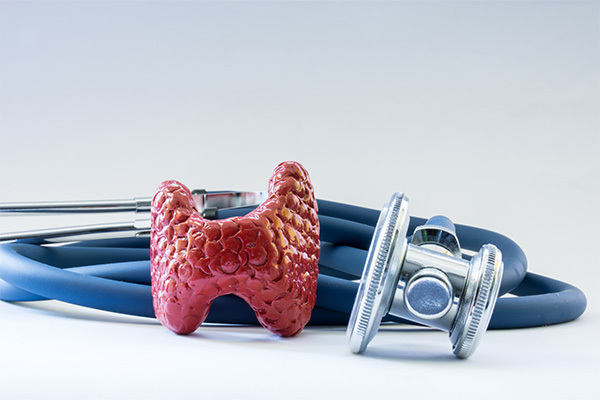
Hypothyroidism is a chronic condition that is commonly treated with thyroid hormone replacement therapies that require periodic follow-ups and dose adjustment throughout the lifelong treatment.
Underdosage can lead to unresolved hypothyroidism, whereas overdosage can trigger hyperthyroidism.
Here are some commonly used hormone replacement therapies for hypothyroidism. (2)
1. Natural thyroid preparations
Desiccated thyroid, or thyroid extract, is a prescription medication obtained from a pig’s glands and contains both T3 and T4 hormones. It is mostly used in alternative medicine and can be difficult to titrate and adjust.
2. Levothyroxine (T4)
Levothyroxine is the standard treatment for overt clinical hypothyroidism. It can also be used in some cases of subclinical hypothyroidism when the presence of a goiter or antithyroid antibodies is confirmed.
3. Liothyronine (T3)
Liothyronine can be used for people who do not fully respond to levothyroxine treatment due to the rare inability to convert T4 into T3. However, the effectiveness of this medication is still inconclusive.
Precautions When Taking Thyroid Hormones
Avoid consuming the following items together with thyroid hormones:
- Soybean flour
- Walnuts
- Cottonseed meal
- Calcium supplements
- Iron supplements or multivitamins containing iron
These items should be taken 3–4 hours before or after taking thyroid hormone preparations.
Diagnosing Hypothyroidism
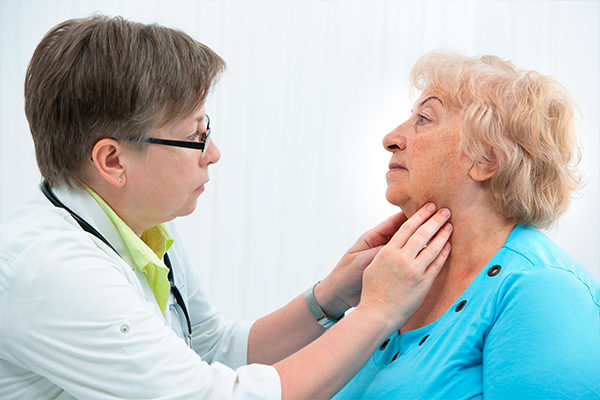
The pituitary gland controls the release of T3 and T4 hormones by varying its production of thyroid-stimulating hormone (TSH). Therefore, a deficiency of thyroid hormones, or hypothyroidism, can be detected by analyzing the levels of T4 and TSH in the blood. (3)
The routine procedure for the diagnosis of hypothyroidism involves the following tests:
1. Clinical evaluation
The doctor may suggest different tests if you are likely to develop hypothyroidism according to your medical and family history but do not have any symptoms yet.
A family history of thyroid problems, goiter, autoimmune disease, head or neck irradiation, taking medications that affect thyroid function, and radioactive iodine therapy are some factors that increase the risk of hypothyroidism.
2. Physical exam
The doctor will check your thyroid gland and look for the presence of other symptoms such as slow reflexes, swelling, dry skin, and slow heart rate.
3. Blood test
This test measures the levels of TSH and T4 hormones in your blood. A low T4 level, along with a high TSH level, indicates hypothyroidism. In mild or early hypothyroidism, the T4 level may be normal, while the TSH level is high.
4. Imaging
Uncommonly, you may be advised to undergo an MRI brain scan or other imaging tests if the doctor suspects a hypothalamic or pituitary cause.
Far more commonly, a thyroid ultrasound might be pursued to better assess the size and texture of the thyroid gland and to rule out the presence of thyroid nodules or cysts.
5. Thyroid antibody tests
Measuring the levels of thyroid antibodies can help detect Hashimoto’s disease, which is the most common cause of hypothyroidism.
Risk Factors for Hypothyroidism
Multiple factors can predispose you to develop hypothyroidism, including:
- Prior thyroid surgery
- Radiation therapy for the neck or head
- Family history of hypothyroidism
- Gender – Women are more likely to develop hypothyroidism than men
- Old age – Individuals above 65 are at a higher risk.
Complications Associated With Hypothyroidism
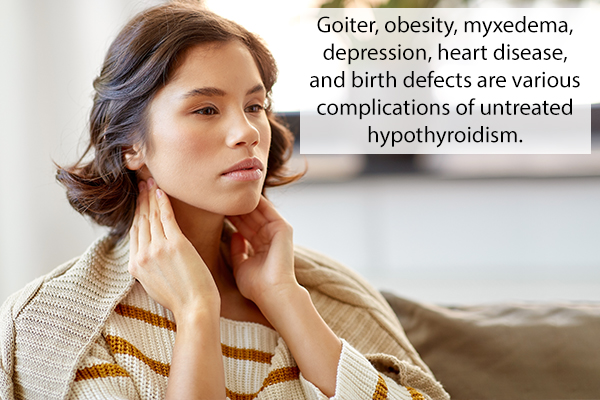
When left untreated, hypothyroidism can cause various complications such as:
1. Goiter
The pituitary gland stimulates the thyroid to produce hormones through chemical messages. In response to the chemical stimuli, the thyroid gland enlarges, known as goiter.
2. Obesity
Excessive weight gain is one of the most common effects of an underactive thyroid gland since the thyroid hormones regulate metabolism.
3. Myxedema
This is a rare but potentially fatal condition wherein the body fails to maintain homeostasis due to the failure of adaptive mechanisms.
4. Depression
Hypothyroidism is a common cause of severe depression, especially in older women.
5. Heart disease
A prolonged deficiency of thyroid hormones can slow down the heart rate, weaken the heart muscle, increase cholesterol levels (especially LDL) that can lead to atherosclerosis, and occasionally cause fluid buildup in the space surrounding the heart, known as pericardial effusion.
6. Birth defects
Because the thyroid hormones are vital for the growth of the brain and nervous system of the baby, hypothyroidism, especially in the first trimester, can result in loss of IQ points, learning disabilities, and problems in the development of the child. (4)
When to See a Doctor
Visit a doctor and get yourself tested for hypothyroidism if you experience the following symptoms:
- Unexplained weight gain
- Fatigue
- Sensitivity to cold
- Dry skin and hair
- Depression
- Muscle pain
Expert Answers (Q&A)
Answered by Dr. Tharsan Sivakumar, MD (Endocrinology)
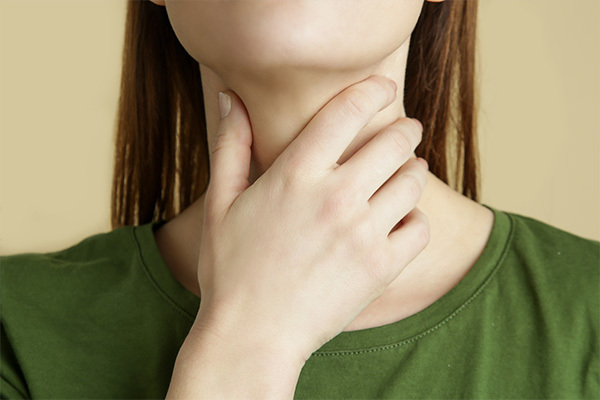
An individual can, during a period of time, convert from hyperthyroidism to hypothyroidism and vice versa, but it is quite rare for both conditions to occur simultaneously. (5)
Hashimoto’s thyroiditis is the most common cause of hypothyroidism wherein thyroid auto-antibodies attack one’s own thyroid gland.
But at some periods of time, it can also cause Hashimoto’s toxicosis, which is a transient form of hyperthyroidism. People with hypothyroidism can also develop other types of hyperthyroidism and vice versa.
The typical mood change caused by hypothyroidism is sadness or depression. Hypothyroidism can also lead to fatigue, which can also affect a person’s mood.
The production of thyroid hormones depends on iodine, which the body does not make itself but has to be derived from various food sources such as dairy products, seafood, meat, eggs, and some breads. Thus, it is essential that patients take an adequate amount of iodine in their diet.
Most people in developed nations get enough iodine from these foods and iodized table salts, except for maybe pregnant women who may need supplementary iodine administered through prenatal vitamins. Worldwide, however, at least 30 countries are iodine deficient. (6)
The fetus does not have a thyroid gland and therefore does not produce its own thyroid hormone during most of the first trimester. At this time, the fetus derives all of its necessary thyroid hormone from the mother. For this reason, it is especially important that in the first trimester, the mother’s hypothyroidism is treated.
It is, however essential to treat hypothyroidism not only during the first trimester but throughout the pregnancy.
Even mild hypothyroidism can cause adverse gestational outcomes, such as preterm delivery, low birth weight, fetal death, and impaired intellectual development of the baby. (7)
There isn’t enough conclusive research to show that women with borderline hypothyroidism can avoid miscarriages or infertility through hormone supplementation, but it is still medically recommended due to the potential benefits and low risk of side effects. (8)
In women who have overt (as opposed to borderline) hypothyroidism, it is more established that hypothyroidism can affect fertility rates and can increase the risk of miscarriages.
Women who are hypothyroid may not produce enough luteinizing hormone (LH), which is involved in the mid-menstrual cycle surge of hormones that signal the ovaries to release an egg. Without this signal, ovulation may not occur, which will impede conception.
In a study where approximately 24% of infertile women were diagnosed with hypothyroidism, researchers found that over 76% of these women could conceive within 6 months to 1 year after getting their hypothyroidism treated. (9)
It is not possible to check your thyroid hormone levels at home by yourself. You will need a blood test. The easiest way for most people is to ask their healthcare providers to do a simple blood test to check their levels.
Final Word
Hypothyroidism may be caused by autoimmune disorders or a lack of iodine in your diet. There is no way to cure hypothyroidism permanently.
However, sometimes people who have hypothyroidism regain normal thyroid function either temporarily or permanently, depending on several factors, such as the cause of the hypothyroidism and the residual thyroid function remaining.
Another way of regaining normal thyroid function is by correcting other illnesses or factors contributing to the hypothyroidism.

- Was this article helpful?
- YES, THANKS!NOT REALLY


